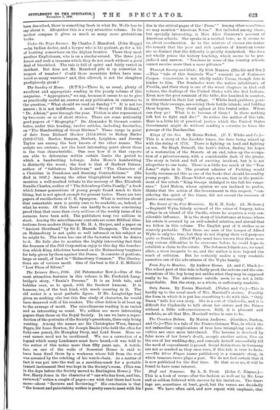The Leisure Hour, 1896. (56 Paternoster Row.)—One of the most
attractive features in this volume is Mr. Frederick Lang. bridge's story, " Dania's Dreams." It is an Irish tale, and bubbles over, so to speak, with the freshest humour. It is humour, too, of the best kind, with much meaning in it. The old rector is a most pathetic figure. If Mr. Langbridge had given us nothing else but this fine study of character, he would have deserved well of his readers. The other fiction is at least up to the average of merit. The miscellaneous reading is as varied and as interesting as usual. We seldom see more interesting papers than those on the Royal Society. In one we have a repro- duction of the portraits of the Society's presidents, three only being wanting. Among the names are Sir Christopher Wren, Samuel Pepys, Sir Isaac Newton, Sir Joseph Banks (who held the office for forty-one years), Sir Humphry Davy, and Lord Rosso. More re- cent names need not be mentioned. We see a correction of a legend which many Londoners must have heard,—it was told to the writer of this notice more than fifty years ago. A watch- face on one of the walls of Somerset House is said to have been fixed there by a workman whose fall from the roof was arrested by the catching of his watch-chain. As a matter of fact it was put into the wall as a meridian-mark for a portable transit instrument that was kept in the Society's room. (This was in the days before the Society moved to Burlington House.) The Rev. Harry Jones in the character of "one who has been, and bas, reviewed," writes a couple of pages—we wish that there had been more—about "Reviews and Reviewing." His conclusion is that "the honest and painstaking author is pretty sure to meet with his
due in the critical pages of the ' Press.' " Among other miscellanea we may mention " American Notes." Not included among these, but specially interesting, is Miss Alice Zimmern's account of American schools. She speaks in a neutral tone, as it seems to us, about co-education. As to the mixture of classes she makes the remark that the poor and rich quarters of American towns are so distinct that the difficulty is greatly diminished. She does not wholly praise the history teaching, which seems to be pre- judiced and narrow. "Teachers in some of the country schools cannot receive more than a mere pittance."


















































 Previous page
Previous page